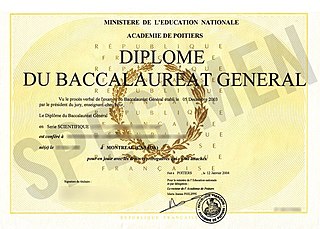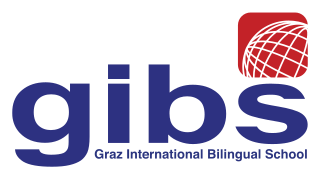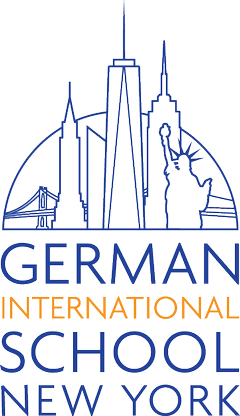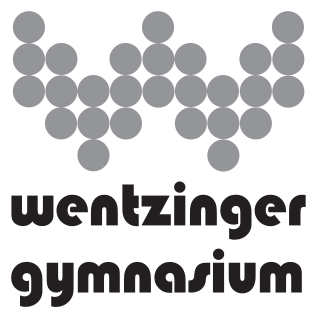
Gymnasium is a term in various European languages for a secondary school that prepares students for higher education at a university. It is comparable to the US English term preparatory high school or the British term grammar school. Before the 20th century, the gymnasium system was a widespread feature of educational systems throughout many European countries.
Abitur, often shortened colloquially to Abi, is a qualification granted at the end of secondary education in Germany. It is conferred on students who pass their final exams at the end of ISCED 3, usually after twelve or thirteen years of schooling. In German, the term Abitur has roots in the archaic word Abiturium, which in turn was derived from the Latin abiturus.

Maturità or its translated terms is a Latin name for the secondary school exit exam or "maturity diploma" in various European countries, including Albania, Austria, Bosnia and Herzegovina, Bulgaria, Croatia, Czech Republic, Hungary, Italy, Kosovo, Liechtenstein, Montenegro, North Macedonia, Poland, Serbia, Slovakia, Slovenia, Switzerland and Ukraine.

The baccalauréat, often known in France colloquially as the bac, is a French national academic qualification that students can obtain at the completion of their secondary education by meeting certain requirements. Though it has only existed in its present form as a school-leaving examination since Emperor Napoleon Bonaparte's implementation on March 17, 1808, its origins date back to the first medieval French universities. According to French law, the baccalaureate is the first academic degree, though it grants the completion of secondary education. Historically, the baccalaureate is administratively supervised by full professors at universities.

Education in Germany is primarily the responsibility of individual German states, with the federal government only playing a minor role.
The Danish gymnasium offers a 3-year general academically-oriented upper secondary programme which builds on the 9th-10th form of the Folkeskole and leads to the upper secondary school exit examination. This qualifies a student for admission to higher education Preparatory, subject to the special entrance regulations applying to the individual higher education programmes. Colloquially, gymnasium refers to what is formally called STX.

The Liechtensteinisches Gymnasium is a secondary school located in Vaduz, Liechtenstein. It was founded in 1937 as the Collegium Marianum by the Maristen-Schulbrüder as an independent school. Since 1981, the Liechtensteinisches Gymnasium has been a public school run by the state of Liechtenstein.

The German School of Budapest - Thomas Mann Gymnasium is a private international school in Budapest, Hungary. It was founded in 1908 to serve German families in Hungary. It now has a diverse student body with primarily children of the expatriate business and diplomatic communities. Considered to be one of the best schools of its kind, it was awarded a Certificate of Excellence by the Central Agency for German Schools Abroad in 2012 and again in 2020.
The European Baccalaureate is a bilingual educational diploma, which certifies the completion of secondary studies in a European School or Accredited European School by the Board of Governors of the intergovernmental organisation, "The European Schools". The diploma is awarded for the successful achievement of coursework and concomitant examinations which require that students take a minimum of 10 courses as well as be fully proficient in two languages. Students may take up to 14 courses. It is officially recognised as an entry qualification for Higher Education in all the member states of the European Union (EU), as well as in a number of others. All participating countries are legally obligated to ensure EB diploma holders enjoy the same rights and benefits as other holders of secondary school-leaving certificates in their jurisdictions. The name ‘European Baccalaureate’ belongs solely to the European Schools, which, since their establishment, have had a monopoly over its use in all the official languages of the EU.
Eleventh grade is the eleventh year of formal or compulsory education. It is typically the 3rd year of high school. Students in eleventh grade are usually 16–17 years of age.

A Hauptschule is a secondary school in Germany, starting after four years of elementary schooling (Grundschule), which offers Lower Secondary Education according to the International Standard Classification of Education. Any student who attends a German elementary school can go to a Hauptschule or Gesamtschule, while students who want to attend a Realschule or Gymnasium need to have good marks in order to do so. The students spend five to six years at the Hauptschule, from 5th to 9th grade. They finish around age 15 to 17.
Voorbereidend wetenschappelijk onderwijs, also often referred to as Voortgezet Wetenschappelijk Onderwijs is the highest variant in the secondary educational system of the Netherlands, attended by approximately a fifth of all Dutch high school students. After leaving primary or elementary school students are enrolled in different types of secondary schools, according to their academic ability. The course is a six-year course and successful completion allows the candidate admission to Dutch universities. The VWO is therefore a matriculation exam.

Real school is a type of secondary school in Germany, Switzerland and Liechtenstein. It has also existed in Croatia, the Austrian Empire, the German Empire, Denmark and Norway (realskole), Sweden (realskola), Finland (reaalikoulu), Hungary (reáliskola), Latvia (reālskola), Slovenia (realka), Serbia, and the Russian Empire, including partitioned Poland.

Gymnasium, in the German education system, is the most advanced and highest of the three types of German secondary schools, the others being Hauptschule (lowest) and Realschule (middle). Gymnasium strongly emphasizes academic learning, comparable to the British grammar school system or with prep schools in the United States. A student attending Gymnasium is called a Gymnasiast. In 2009/10 there were 3,094 gymnasia in Germany, with c. 2,475,000 students, resulting in an average student number of 800 students per school.
Berufsoberschule is an optional part of the German education system, and is an additional way to be allowed at university for students who didn't get an Abitur at a Gymnasium.
An Abendgymnasium or "evening gymnasium" is a German class of secondary school for adults over the age of 18 which allows them to gain the Abitur. They were started in the 1920s as an opportunity for working class adults to improve their career options.

The Graz International Bilingual School (GIBS) is an Austrian bilingual (English/German) university preparatory semi-independent charter school Gymnasium in Graz, Austria. The school mainly focuses on languages, offering German, English, Russian, Latin, French and Spanish. Students graduate with the Austrian Matura, the IB Diploma or with both, assuming that they meet the criteria necessary.

German International School New York is a private, bilingual (German/English) college preparatory school that enrolls over 400 students in grades Pre-K through 12. The School is located in White Plains, New York, approximately 25 miles north of New York City, and is divided into three schools on the same campus: the Lower School, the Middle School and the Upper School.

The Wentzinger-Gymnasium Freiburg is a grammar school in Freiburg, Germany, that not only has a scientific and a linguistic profile, but is one of only 38 schools in Baden-Württemberg that has a music profile and also has a bilingual profile for French, which leads to the AbiBac, a double high school diploma. At present, around 1,000 pupils are taught at the Wentzinger grammar school, most of them from the city of Freiburg and the district of Breisgau-Hochschwarzwald. The name of the grammar school refers to the Freiburg artist and honorary citizen Johann Christian Wentzinger (1710–1797). The school returned to a nine-year curriculum. The so-called G8 curriculum that leads to the High School diploma in only eight years instead of nine, is no longer offered. This applies for all new registrations. Ongoing G8 classes are maintained.